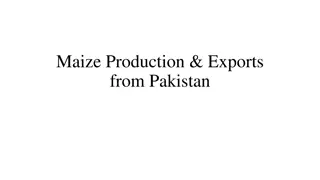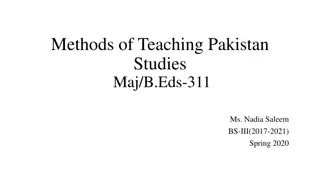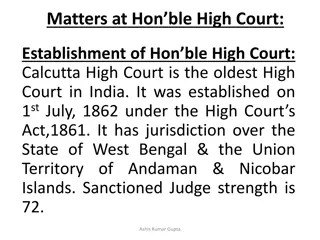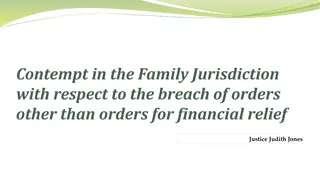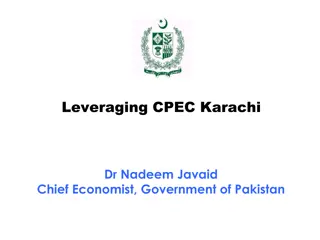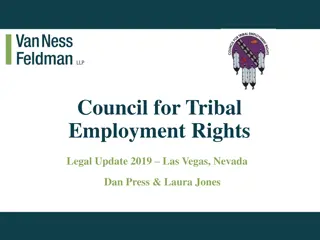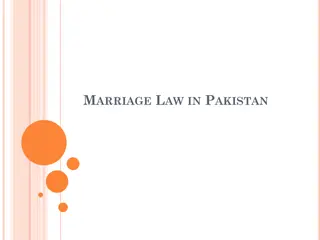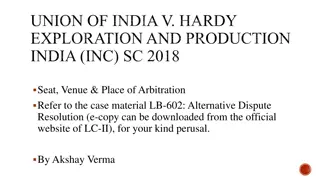Family Law in Pakistan: Overview and Jurisdiction
Explore the comprehensive family laws in Pakistan, including enactments like the Muslim Family Laws Ordinance and Dissolution of Muslim Marriage Act. Learn about the jurisdiction of family courts, the process of divorce, talaq under the Muslim Family Law Ordinance, and territorial jurisdiction considerations.
Download Presentation

Please find below an Image/Link to download the presentation.
The content on the website is provided AS IS for your information and personal use only. It may not be sold, licensed, or shared on other websites without obtaining consent from the author. Download presentation by click this link. If you encounter any issues during the download, it is possible that the publisher has removed the file from their server.
E N D
Presentation Transcript
FAMILY LAW IN PAKISTAN By Amna Abbas
List of Enactments The Muslim Family Laws Ordinance, 1961 Dissolution of Muslim Marriage Act, 1939 Divorce Act, 1869 Guardian and Wards Act, 1890 High Court Rules [Volume II] Guardian and Wards Maintenance Order Enforcement Act, 1921 Family Courts Act, 1964 Family Court Rules, 1965 Foreign Marriage Act, 1903 Christians Marriage Act 1972 Child Marriage Restraint Act 1929
The Jurisdiction for Divorce in Pakistan (including for expatriates)
Jurisdiction of Family Courts u/ Family Courts Act 1964 In short, family courts have exclusive jurisdiction in following matters:- (a) Dissolution of marriage including Khula (b) Dower (c) Maintenance (d) Restitution of conjugal rights (e) Custody of children and the visitation rights of parents (f) Jactitation of marriage (g) Dowry (h) Personal property and belongings of wife (i) Guardianship (j) Offences specified in Part II of the Schedule, where one of the spouses is victim of an offence committed by the other
Territorial Jurisdiction The court in whose local limits cause of action arose either wholly or in part or where the parties reside or last resided together has the jurisdiction to hear the suit. However, in cases of dissolution of marriage and dower within the local limits of which the wife ordinarily jurisdiction. the court resides has the
Is Divorce a Court Based Process, or are there Administrative Alternatives?
Talaq For talaq to be effectuated, we shall look at s. 7(1) of the Muslim Family Law Ordinance (MFLO) 1961. According to this, once the husband has pronounced talaq, in whatsoever form he has chosen, he shall submit a written notice with the Chairman of the Union Council. The Chairman shall thereon, within 30 days of receipt of the written notice, constitute an Arbitration Council, which shall commence reconciliation between the parties. The parties will have a period of 90 days, known as Iddat, commencing from date the Chairman receives the talaq notice, before the divorce becomes effective. If the wife is pregnant, the iddat period would continue till the end of the pregnancy, and the talaq would only become effective after that. Once the iddat period has lapsed, the Chairman shall issue a talaq certificate to both parties, which shall be effective in letter and spirit.
Although notice of the talaq to the Chairman is mandatory, there is still some ambiguity regarding the validity of a divorce without any such notice. The Supreme Court of Pakistan decided in Ali Nawaz Gardezi v Muhammad Yusuf (1963) that the notice to the chairman was mandatory and a divorce, however pronounced, would be without effect if the required notice was not given. However, the Federal Shariat Court held, in the case of Allah Rakha v The Federation of Pakistan 2000, inter alia questioned the mandatory notice requirement to the Chairman of the Arbitration Council, holding that it should not be punishable since no notice is required under the stipulations of the Holy Quran. Thereon, the FSC conclusively held that the period of iddat commences from the date of pronouncemt of Talaq by the husband and not from the date of delivery of notice to the chairman. The matter is currently pending appeal in the Shariat Bench of the Supreme Court.
Judicial Separation (Khula) Judicial procedure To apply for a Khula or judicial divorce, the wife would need to file a suit in the Family Court. She shall do so by merely raising the ground that she feels she can no long live with her husband within the limits prescribed by Allah . Such a statement in her suit, undertaken on oath, would be sufficient to establish her case for a Khula. In khula divorce, the wife must forgo 50 % - 100 % of her right to Haq Mehar i.e. dower. Claim to any other bridal gifts may be appropriately decided by the court. If the wife fails to return the required items, the decree for Khula does not become ineffective. The husband would simply have to file a separate suit for the recovery of the gifted items.
FASKH (Judicial Dissolution) The procedure adopted for judicial dissolution shall be the same as provided for Khula through the court. However, in case of judicial dissolution (faskh) the wife would have to base her dissolution of marriage application on any one of the following grounds: Desertion by the husband for a period of four years; Failure to provide for maintenance for two years; Husband s failure to perform his marital obligations; Husband s imprisonment sentence for over a period of seven years; Husband s continued impotency since the time of marriage; Husband taking another wife in contravention of established legal procedures provided under the MFLO 1961; Husband's insanity or some other serious illness for a period of two years; That the wife was a minor at the time of marriage; Husband s cruelty, whether physical, mental, or any other form of mistreatment; Any other ground that may considered valid for the dissolution of marriage under Muslim Personal Law.
Talaq-i-Tafweez: This is where the wife has been delegated the right to divorce in contract. the nikama/marriage There are no procedural impediments in this type of divorce. The marriage can be dissolved easily, without recourse to the courts. Adopting the process for Talaq. This delegated the right of Divorce in her nikahnama (clause 18), entitles the wife to the same rights as those provided to the husband under talaq.
Mubaraat There s no need to approach the courts, which means that the marriage are often dissolved quickly, cheaply and problems. during this case both husband and married woman might sign a Mutual Divorce Deed. with few procedural Thereafter they must send a written notice under section eight of the Muslim Family Law Ordinance to the concerned union council. The Union council can adopt a similar procedure as of normal notice of talaq.
Summary of Financial Claims a Wife can make for herself on Divorce
1. In case of Divorce by husband: a. Dower b. Dowry Articles/Gifts c. Maintenance (for Iddat) 2. In case of Khula: a. Dower (50% or 75% depending the nature). b. Dowry Articles/Gifts c. Maintenance (for Iddat)
Summary of Financial Claims that a Wife can make for her Children on Divorce
A divorced mother who has custody of the children can claim: Maintenance, interim as well as for life, for her minors. The distinction between sons and daughters i.e. daughters may be awarded maintenance till marriage or for life, whereas in the case of sons it would be till attaining the age of majority and/or financial independence. law in some cases recognizes a Obligation of the father to maintain his adult son who had not yet completed his basic education, enabling him to earn his livelihood, might be court(s) in an appropriate case. considered by the
Considerations for Maintenance Maintenance meant and included food, raiment and lodging Such definition was neither conclusive nor exhaustive. It has a wider connotation and should be given an extended meaning for the purposes of meeting and catering for the present days social, physical, mental growth, upbringing and well-being of the minor Keeping in mind the status of the family, the norms of the society and his/her educational requirement It would obviously correspond to and be commensurate with the means and the capacity of the father to pay.
Muhammadan Law by D. F. Mullah "370. Maintenance of children and grandchildren.---(1) A father is bound to maintain his sons until they have attained the age of puberty. He is also bound to maintain his daughters until they are married. But he is not bound to maintain his adult sons unless they are disabled by infirmity or disease. The fact that the children are in the custody of their mother during their infancy (section 352) does not relieve the father from the obligation of maintaining them. But the father is not bound to maintain a child who is capable of being maintained out of his or her own property. (2) If the father is poor, and in capable of earning by his own labour, the mother, if she is in easy circumstances, is bound to maintain her children as the father would be. (3) If the father is poor and infirm, and the mother also is poor, the obligation to maintain the children lies on the grandfather, provided he is in easy circumstances."
Child Custody Post Divorce Brief Overview
A Family Court can entertain any suit relating to custody of children according to Family Courts Act 1964 under Guardian and Wards Act. a) In case of dispute the Court assumes guardianship of the minor. b) Welfare of the minor. c) General rule is that the interest and welfare of the minor child should be of paramount consideration. d) Willingness of the major children. e) Visitation rights. f) Custody laws favour the mother, however, visitation with the father is usually deemed to be in the best interest of the Minor. g)
UK Pakistan Protocol Signed Between: President of the Family Division and the Hon. Chief Justice of Pakistan in consultation with senior members of the family judiciary of the UK and Pakistan having met on 15th to 17th January 2003 in the Royal Courts of Justice in London, signed said Protocol. Desiring to protect the children of the UK and Pakistan from the harmful effects of wrongful removal or retention from one country to the other. In normal circumstances the welfare of a child is best determined by the courts of habitual/ordinary residence. the country of the child's In case of wrongful removal, the judge of the court of the country to which the child has been removed shall not ordinarily exercise jurisdiction over the child, save in so far as it is necessary for the court to order the return of the child to the country of the child's habitual/ordinary residence.
UK-Pak Protocol (Cont..) Liaison Judges judges of the Superior Courts of both countries nominated to further the aims of the Protocol. Suplemental judicial Guidelines: Raising public awareness of protocol, maintaining awareness and providing continuing education to judiciary and practitioners involved in family-child cases. Securing access to justice to 'left behind' parents including knowledge of their rights and the opportunity to assert them. To that end, instituting a system whereby the Judge in each Province of Pakistan is tasked with over-seeing the formation of a Committee to provide legal assistance to such parents. Recognition of the importance of mediation within the extended family. Recognition of the importance of liaison between Pakistan and the United Kingdom
Hague Convention Pakistan has become the 4thMuslim State in the world, and 1st South Asian Country to become Convention on the Civil Aspects of Child Abduction on 22nd December 2016. signatory to the Hague By exercising the powers conferred by Section subsection 3 of the West Pakistan Family Courts Act 1964, the Act has been amended to include Section 6A in Schedule: Matters pertaining to Return of the Child under Hague Convention International Child Abduction on Civil Aspects of Article 6 of the Convention provides for the designation central authority to discharge Convention obligations. Pakistan s Central Authority has been designated within the Solicitor General s Office at the Ministry of Law, Justice and Human Rights. Where an incoming application is requested to the Solicitor General s Office accompanied by a Court order for return, the Central Authority will pursue, verify and return the child accordingly. If a case is pending the Central Authority will provide legal assistance to the applicant from a contracting state in order to return the child. of a
The Ability to Enforce Foreign Family Orders in Pakistan
A creditor under a foreign judgment has three options: to seek direct execution under the relevant provisions of the Civil Procedure Code, 1908 (CPC), where the country rendering the judgment is designated by the Government of Pakistan as a reciprocating territory [declared as such under S. 44A CPC] to file a suit in Pakistan on the basis of a foreign judgment, treating it as a cause of action; to file a suit on the original cause of action. Under Section 14 of the CPC courts in Pakistan shall upon the production of a certified copy of the foreign judgment presume that it has been given by a court of competent jurisdiction, unless the contrary appears form the record. The onus of proving that the foreign court was not a court of competent jurisdiction, will lie on the party asserting the same.
Enforcement proceedings can only be challenged on specific grounds set out in the CPC and these include: (i) where the judgment has not been pronounced by a Court of competent jurisdiction (ii) where it has not been given on the merits of the case (iii) where it appears on the face of the proceedings to be founded on an incorrect view of international law or refusal to recognize the law of Pakistan in cases where such law is applicable (iv) where the proceedings in which the judgment was obtained are opposed to natural justice (v) where it has been obtained by fraud; and (vi) where it sustains a claim founded on a breach of any law in force in Pakistan.
Louise Anne Fairley vs. Sajjad Ahmed Rana [PLD 2007 Lahore 293] before Mian Saqib Nisar, J Petitioner Citizen of UK Respondent Dual nationality of UK and Pakistan, domiciled in Glasgow They had a minor daughter who was a British National While the matter of custody was still pending in the foreign Court, the father removed the child from Glasgow. Mother of minor had sought custody of the minor by invoking habeas corpus petition. Despite restraining order passed by a Court of foreign jurisdiction, father removed the minor to Pakistan. Validity: Father having admitted himself in the jurisdiction of foreign Court was debarred to bring the child to Pakistan If a Pakistani Court had passed an order directing not to remove a child from the custody of a parent by the other and order was violated, such act would fall within the ambit and scope of Art. 199 of the Constitution and S.491, Cr.P.C. The same rule could be extended to the valid orders of foreign jurisdiction, especially to which jurisdiction the defaulting party (father) had surrendered.



